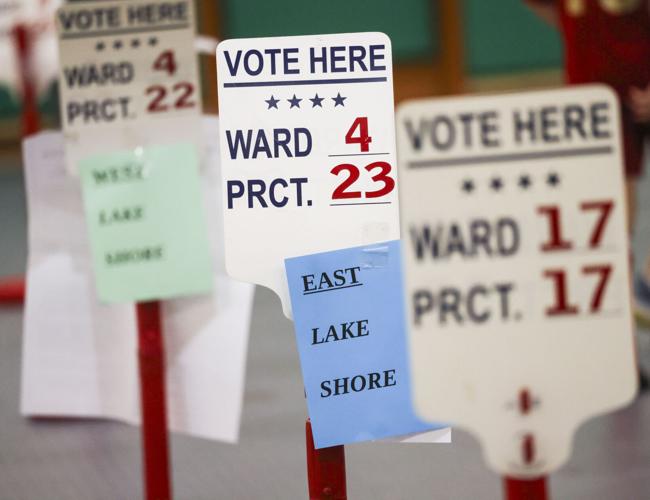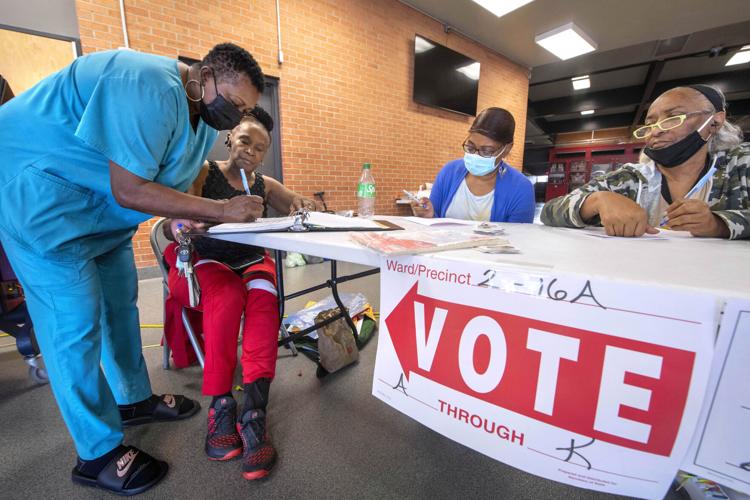Louisiana voters didn't turn out much during the early voting period that ended Saturday.
Just under 254,000 people took the opportunity to vote early in the Nov. 18 runoffs. That included more women (140,606) than men (113,316), more Whites (189,172) than Blacks (58,410), and more Republicans (119,942) than Democrats (96,603).
These are some interesting facts, but it's horrible when considering that our state has nearly 3 million registered voters. We just don't have enough people voting.
It's been this way too long.
Early voting remains popular, but the numbers are paltry. Based on last week's early voting tallies by the Secretary of State's office, 191,496 people cast in-person ballots. Another 62,486 cast absentee ballots.
Attorney General Jeff Landry and his team were hoping to win the Oct. 14 primary and eliminate the need for a gubernatorial runoff on Oct. 14. They got their wish. Overall primary voter turnout was only 36%, and Landry won outright with 52% of the votes cast — more than the 50% plus one he needed.
The last time that happened was when Bobby Jindal won the 2007 and 2011 gubernatorial primaries.
The primary turnout in 2007 was 46.6%, significantly higher than on Oct. 14. With a much smaller ballot to generate voter interest, turnout in the 2007 general election fell to 26.4%, according to the Secretary of State's website.
Jindal faced token opposition in 2011 and won the primary easily, but turnout was a paltry 32.8%; it dropped to 22.5% in the runoff, according to the Secretary of State's figures.
Using recent history as a guide, it's likely that turnout for Saturday's general election voter turnout will be lower than the low primary turnout of 36%. Some think we may even have a historic low turnout this weekend.
Three statewide runoffs appear on Saturday's ballot. Voters will choose our next Attorney General between Republican Liz Murrill, the incumbent Solicitor General under Gov.-elect Jeff Landry in his AG role, and Democrat Lindsey Cheek, a New Orleans attorney. The victor will become Louisiana's first woman AG.
Democrat "Gwen" Collins-Greenup is a Baton Rouge attorney running to be Louisiana's next Secretary of State, after Republican incumbent Kyle Ardoin opted not to seek reelection. Ardoin's first assistant SOS, former state Rep. Nancy Landry, a Republican like Ardoin, now seeks the top job.
Dustin Granger is the most high-profile Democrat left running for a statewide office. A financial adviser, he hopes to buck the Republican desire to hold all statewide elected offices. He wants to be Treasurer. So does Republican former Congressman John Fleming, from Minden, which is about 30 minutes from Bossier City and Shreveport.
Those who follow politics, campaigns and elections closely think they know what's going to happen.
John Couvillon, a well-known pollster and campaign consultant with JMC Analytics, said there's a more than a good chance that all three GOP statewide candidates will win. There's a "minimal chance for Democrats," he said.
Couvillon works with anyone who wants his services, but mostly with Republicans. Silas Lee, a local and national pollster who heads Lee and Associates consulting firm, is happy to work with anyone who wants his services, but he works mostly with Democrats.
"What's changed between now and the last election?" Lee asked me rhetorically when I spoke to him Monday. "Nothing."
These are not things Granger, Cheek and Greenup want to hear.
"Voters aren't interested," Lee said, providing more context. "The governor's race has been decided. ... (Voter turnout) might be even lower this time."
With the low turnout the last time and three Democratic statewide candidates who are not as visible as they might be with more resources, it seems likely the Republican statewide candidates will win.
But it doesn't have to be that way.
Plan to vote Saturday. Identify a bunch of family members and friends who should vote. Encourage them to break the cycle of low general election voter turnout without a U.S. presidential election or a U.S. Senate election or a Louisiana governor election on the ballot.
After recent Democratic wins in Kentucky, Ohio, Pennsylvania and Virginia, President Joe Biden posted a note on social media reminding everyone who's in charge. In part, it read "Voters vote. Polls don't."
Political parties, campaigns, consultants and pollsters don't get to decide. You do.
By voting, you can prove the experts wrong.













